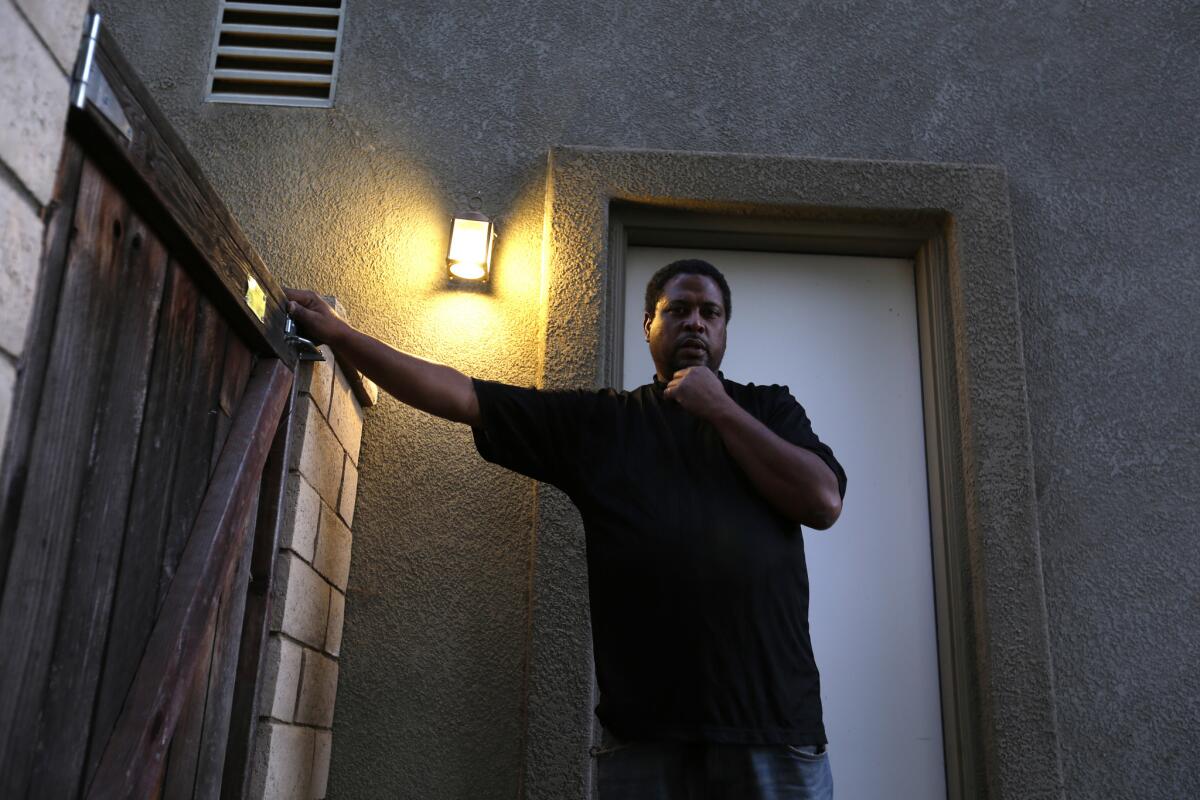A frenzied start for stateâs traffic ticket amnesty program

Fredrick Jefferson at the home in Corona where he is staying. Jefferson 46, is among millions of Californians who lost their driverâs licenses because of unpaid traffic fines.
Heavy equipment mechanic Fredrick Jefferson said it was when a supervisor fired him that he learned his driverâs license had been revoked because of unpaid traffic fines.
Over the next year and a half, the âsnowball effectâ caused his relationship to crumble and he wound up homeless, scraping by on a $221 monthly general relief check.
With add-on penalties, his total fines swelled to $5,000.
Thanks to a sweeping traffic ticket amnesty that took effect Oct. 1, Jefferson now is on a payment plan of $1 per month â an amount that will increase once he lands a job. Last week, he got his license back.
âHaving my license is essential,â Jefferson said. âNow I can go out and work again.â
Across the country, escalating fees have been layered on to base traffic fines to help fund everything from court operations to local and state government programs.
Californiaâs 18-month amnesty â which aims to put a dent in $10 billion in uncollected, court-ordered debt â initially was conceived as a way to revive two law enforcement training programs driven to insolvency by motoristsâ inability to pay. But it has become part of a broader conversation over the funding approach, which has pushed low-income and minority motorists, who are more likely to be stopped by police, deeper into poverty.
Interest in the amnesty program here has been frenzied.
In the first month, the private debt collector managing the program in Los Angeles County fielded 128,000 phone calls. GC Services received applications related to more than 50,000 citations and accepted full or partial payment on more than 12,000 â collecting $1.3 million, according to Los Angeles Superior Court spokeswoman Mary Eckhardt Hearn.
The company also sent the state Department of Motor Vehicles nearly 8,000 requests to reinstate licenses.
According to Teresa Ruano, a spokeswoman for the policymaking body for Californiaâs courts, other counties also have experienced high interest in the program. Statewide data wonât be available until January.
Legal advocates, however, report that the program has been fraught with inconsistencies.
âYou donât want to be too critical ⌠a month into it,â said Michael Herald, legislative advocate for the Western Center for Law & Poverty and an author of the legislation. But, he said, âweâve seen a whole host of counties where, if we donât have an advocate there, folks who should be getting help arenât getting help. Or the vendors who run these programs arenât doing what they can to make sure people are getting the full benefit of the law.â
According to a consumer alert from state Atty. Gen. Kamala Harris, some debt collection agencies under contract to county courts have told some eligible consumers that they donât qualify, failed to tell others about the program, pressured consumers to make âgood faithâ payments without telling them it would make them ineligible for debt reduction and failed to notify the DMV about people who met the criteria to get their licenses back.
A Harris spokeswoman declined to identify the companies or the volume of complaints, saying only that they spanned the state and involved more than one vendor.
Jefferson, who has found a place to live in Corona, said that a GC Services representative at the Metropolitan Courthouse south of downtown Los Angeles told him last month that he was ineligible for the amnesty because he had gotten his tickets after Jan. 1, 2013.
That did rule out the 80% debt reduction available to people on public assistance. But the program still allows those who received tickets after that date to get on a payment plan and have their licenses restored.
âThey didnât once tell me I would qualify,â he said. âThey will discourage you right there at the [courthouse] window.â
GC Services referred calls seeking comment to Hearn.
Fortunately for Jefferson, he had Theresa Zhen, a pro bono attorney with the Los Angeles-based A New Way of Life, at his side. Zhen was able to quote the law, which she helped craft, and negotiate a payment plan that Jefferson could afford â down from $150 per month to $1.
An April report co-written by Heraldâs and Zhenâs organizations, along with three Bay Area civil legal aid groups, found that the DMV had issued more than 4.3 million license suspensions between 2006 and 2013 as a result of failures to appear in court or pay traffic fines, fees and penalties. A DMV spokesman said there are 612,831 drivers whose licenses have been suspended for those reasons.
The amnesty, which runs through March 31, 2017, applies discounts (of 50% or 80%, depending on income) to pre-2013 unpaid tickets for some traffic misdemeanors and all infractions except for parking, reckless driving and driving under the influence.
Non-traffic infractions processed through traffic courts â for jaywalking or street vending, for example â also qualify.
Last week, Zhen and attorneys for seven other Los Angeles County-based legal organizations sent a letter to Superior Court Executive Officer Sherri R. Carter outlining problems with implementation of the amnesty program and recommending fixes. Among their suggestions was more oversight of the debt-collection contractor.
In a reply Friday, Carter noted that 1.2 million citations had been flagged as âpre-qualifiedâ over the summer and said she was âproud of the success the court has had to-date implementing this new law.â
After a âsomewhat chaoticâ program launch because of last-minute changes in the law, Hearn said, officials have done some fine-tuning and plan to begin conducting a public outreach effort in five languages very soon.
Meanwhile, consumer advocates have been meeting with the state Judicial Council to iron out differences â most notably over whether the amnesty program allows for a $0 monthly payment plan or whether counties should be able to set the floor at $25 per month.
âInterest in it created this rush of calls,â Ruano said, âand I think everybody is just doing the best they can.â
Twitter: @leeromney
Times staff writer Maura Dolan contributed to this report
ALSO
Democratic debate offers proving ground for Bernie Sanders as Clinton pulls away
L.A. council again set to take up homeless emergency declaration with potentially sweeping scope
Tour bus crash in San Franciscoâs Union Square injures at least 19, five critically
More to Read
Sign up for Essential California
The most important California stories and recommendations in your inbox every morning.
You may occasionally receive promotional content from the Los Angeles Times.











